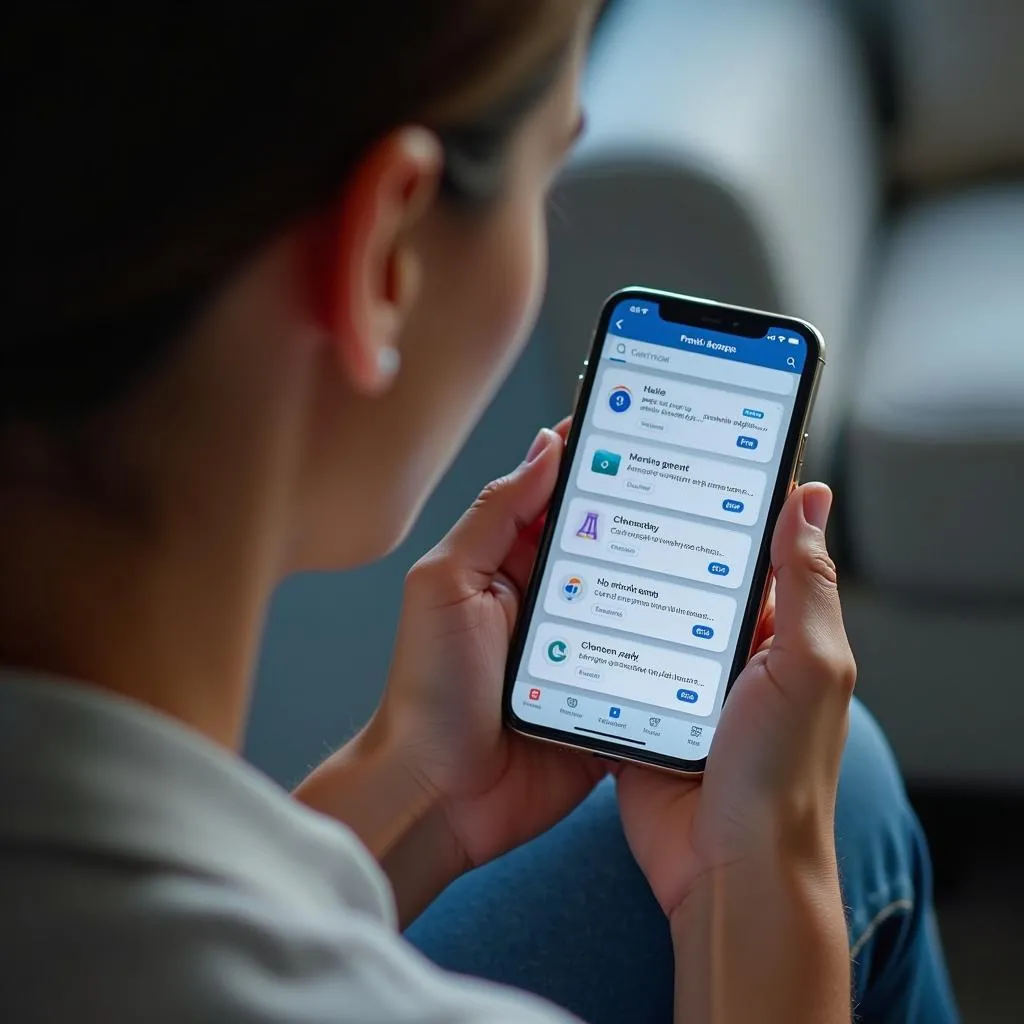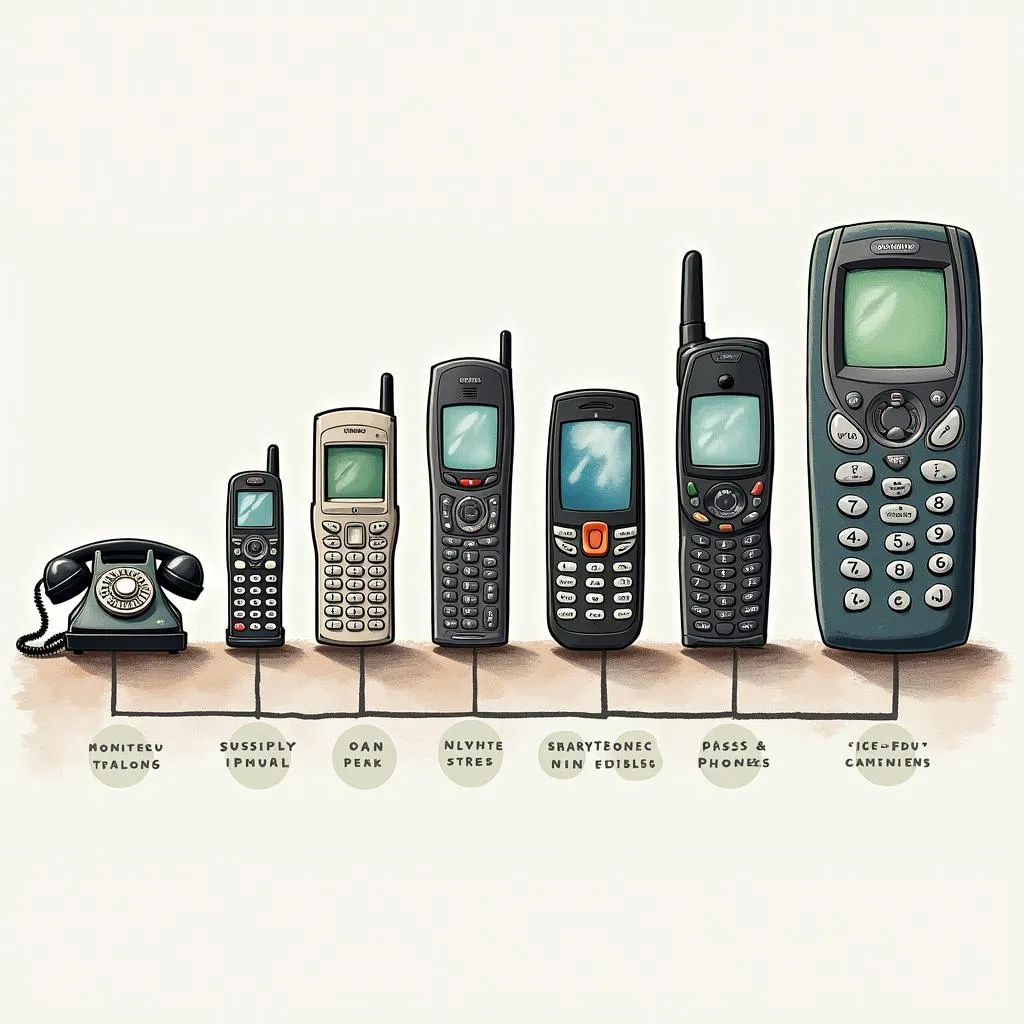The topic “describe a gadget you cannot live without” is a common theme in IELTS Speaking tests. It allows examiners to assess candidates’ ability to discuss technology, personal preferences, and daily routines. This topic has appeared frequently in past exams and is likely to remain relevant in future tests due to the increasing role of technology in our lives.
Nội dung bài viết
Describe a technology that has changed your life is a related topic that can help you prepare for this question. Let’s explore how to approach this topic effectively in each part of the IELTS Speaking test.
Part 1: Introduction and Interview
In this section, the examiner may ask general questions about gadgets and technology. Here’s a sample question with a suggested answer:
Q: How often do you buy new gadgets?
A: I tend to be quite selective when it comes to purchasing new gadgets. I usually only invest in a new device when my current one becomes outdated or stops functioning efficiently. On average, I’d say I buy a new gadget every couple of years or so. I prefer to thoroughly research and compare different options before making a decision, ensuring that I’m getting the best value for my money.
Part 2: Long Turn
Here’s a sample cue card related to the topic:
Describe a gadget you cannot live without
You should say:
- What the gadget is
- When you got it
- How often you use it
And explain why it is so important to you
Sample Answer (Band 6-7):
The gadget I can’t live without is my smartphone. I got my current one about two years ago when my old phone started having battery issues. I use it every day, pretty much all the time.
My smartphone is really important to me for a few reasons. First, it helps me stay connected with my friends and family through messaging apps and social media. I can easily chat with them or see what they’re up to, which is great since some of them live far away.
Second, it’s like a mini-computer in my pocket. I use it for so many things – checking emails, browsing the internet, and even doing some work when I’m not at my desk. It’s really convenient to have all this information at my fingertips.
Lastly, my phone is my main source of entertainment. I use it to listen to music, watch videos, and play games when I have some free time. It’s especially useful when I’m commuting or waiting in line somewhere.
In short, my smartphone has become an essential part of my daily life. It keeps me connected, informed, and entertained, which is why I can’t imagine living without it.
Sample Answer (Band 8-9):
The gadget I find absolutely indispensable in my daily life is my smartphone. I acquired my current model approximately two years ago when my previous device began experiencing significant battery deterioration.
I utilize this cutting-edge piece of technology with remarkable frequency – it’s fair to say it’s an extension of myself, accompanying me throughout my daily routine. Its omnipresence in my life is due to its multifaceted functionality and the unparalleled convenience it offers.
Primarily, my smartphone serves as an invaluable communication tool, enabling me to maintain seamless contact with my social and professional networks. Whether it’s through instantaneous messaging, video calls, or social media platforms, this device bridges geographical gaps and keeps me connected to my global community.
Moreover, the smartphone functions as a portable powerhouse of productivity. It’s my go-to device for managing emails, conducting research, and even tackling work-related tasks when I’m away from my primary workstation. The ability to access and manipulate information on the go has revolutionized my approach to work and personal organization.
Lastly, this gadget serves as my primary source of entertainment and personal enrichment. From streaming music and podcasts to accessing a vast library of e-books and educational content, it’s a treasure trove of entertainment and learning opportunities. This aspect is particularly beneficial during commutes or idle moments, transforming potentially wasted time into productive or enjoyable experiences.
In essence, my smartphone has become an integral part of my lifestyle, enhancing my connectivity, boosting my productivity, and enriching my leisure time. Its versatility and efficiency make it a gadget I truly cannot envision living without in today’s fast-paced, interconnected world.
Follow-up Questions:
Q: Do you think people rely too much on gadgets nowadays?
A: (Band 8-9) While gadgets undeniably offer numerous benefits and have revolutionized various aspects of our lives, there’s a valid argument that excessive reliance on these devices can be detrimental. Many individuals have become so dependent on their gadgets that they struggle to function effectively without them. This over-dependence can lead to issues such as reduced face-to-face communication skills, decreased ability to focus for extended periods, and even physical health problems related to prolonged screen time. However, it’s crucial to strike a balance – harnessing the advantages of technology while maintaining our ability to operate independently of these devices when necessary.
Q: How do you think gadgets will change in the future?
A: (Band 8-9) The future of gadgets is likely to be characterized by increased integration and interconnectivity. We’re already seeing the rise of the Internet of Things (IoT), where everyday objects are becoming smart and internet-connected. I anticipate that future gadgets will become even more seamlessly integrated into our lives, possibly through wearable technology or even implantable devices. Artificial Intelligence will play a more prominent role, making our gadgets more intuitive and capable of anticipating our needs. Additionally, there may be a shift towards more sustainable and eco-friendly technology, with a focus on energy efficiency and recyclable materials. The key will be balancing these technological advancements with ethical considerations and user privacy.
 Smartphone user boosting personal productivity
Smartphone user boosting personal productivity
Part 3: Two-way Discussion
Q: In what ways have gadgets changed the way we communicate?
A: (Band 6-7) Gadgets have really changed how we talk to each other. Now, we can send messages instantly to anyone, anywhere in the world. We can also make video calls, which is great for seeing friends and family who live far away. Social media apps on our phones let us share our lives with lots of people at once. However, some people think that all this technology means we don’t talk face-to-face as much anymore, which can be a problem.
A: (Band 8-9) Gadgets have fundamentally transformed the landscape of human communication. They’ve ushered in an era of instantaneous, global connectivity, enabling us to transcend geographical boundaries with ease. The proliferation of messaging apps and social media platforms has created new forms of expression, allowing for rapid dissemination of information and ideas. Video calling technology has added a visual dimension to long-distance communication, fostering a sense of proximity despite physical separation.
However, this technological revolution in communication is not without its drawbacks. The convenience of digital communication has, in some cases, led to a decline in face-to-face interactions, potentially impacting our ability to read non-verbal cues and develop deep, meaningful relationships. There’s also the issue of digital overwhelm, where the constant stream of messages and notifications can lead to stress and reduced productivity.
Moreover, the anonymity afforded by some online platforms has given rise to issues like cyberbullying and the spread of misinformation. It’s crucial that as we embrace these technological advancements, we also cultivate digital literacy and etiquette to ensure that these tools enhance rather than detract from our communicative abilities.
 Evolution of digital communication through gadgets
Evolution of digital communication through gadgets
Q: Do you think traditional skills are being lost because of our reliance on gadgets?
A: (Band 6-7) Yes, I think some traditional skills are being lost because of gadgets. For example, many people don’t know how to read maps anymore because they always use GPS on their phones. Also, handwriting is becoming less common as we type everything on computers or phones. Some people worry that we’re losing the ability to remember things because we can just look everything up online. However, gadgets also help us learn new skills, so it’s not all bad.
A: (Band 8-9) The increasing ubiquity of gadgets in our daily lives has indeed led to a noticeable decline in certain traditional skills. This phenomenon is particularly evident in areas where technology offers a more convenient alternative. For instance, the widespread use of GPS technology has diminished many people’s ability to navigate using physical maps or landmarks. Similarly, the prevalence of digital communication has led to a depreciation of handwriting skills, with many individuals rarely engaging in longform handwritten communication.
Moreover, our reliance on search engines and digital databases has potentially impacted our capacity for memorization and recall. The ease of accessing information at our fingertips may be reducing our cognitive effort to retain information, leading to what some experts term “digital amnesia.”
However, it’s crucial to recognize that while some traditional skills may be waning, new skill sets are simultaneously emerging. Digital literacy, information synthesis, and the ability to navigate complex technological systems are becoming increasingly valuable in our modern world. The key lies in striking a balance – leveraging technology to enhance our capabilities while consciously preserving essential traditional skills.
Furthermore, the loss of certain skills doesn’t necessarily equate to a net negative. In many cases, technology has democratized access to information and capabilities that were once the domain of specialists. For example, while fewer people may be adept at manual cartography, far more have access to accurate, real-time navigation tools.
In conclusion, while it’s true that some traditional skills are being eroded by our increasing reliance on gadgets, this shift is part of a larger evolution in human capabilities. The challenge lies in thoughtfully integrating technology into our lives, preserving valuable traditional skills where necessary, while embracing the new competencies that our gadget-driven world demands.
Key Vocabulary and Phrases
-
Indispensable /ˌɪndɪˈspensəbl/ (adj): Absolutely necessary.
Example: My smartphone has become an indispensable tool in my daily life. -
Multifaceted /ˌmʌltɪˈfæsɪtɪd/ (adj): Having many different aspects or features.
Example: The multifaceted functionality of modern gadgets makes them incredibly versatile. -
Omnipresence /ˌɒmnɪˈprezns/ (noun): The state of being widespread or constantly encountered.
Example: The omnipresence of smartphones in society has changed how we communicate. -
To revolutionize /ˌrevəluːʃənaɪz/ (verb): To change something radically or fundamentally.
Example: Social media has revolutionized the way we stay connected with friends and family. -
Interconnectivity /ˌɪntəkənekˈtɪvəti/ (noun): The state of being connected with each other.
Example: The Internet of Things relies on the interconnectivity of everyday devices.
Describe a childhood toy you remember fondly can provide additional practice for descriptive speaking tasks.
Examiner’s Advice
To achieve a high score in the IELTS Speaking test when discussing gadgets:
- Use a wide range of vocabulary related to technology and its impact on daily life.
- Provide specific examples to support your points, drawing from personal experiences.
- Discuss both advantages and disadvantages to demonstrate critical thinking.
- Use complex sentence structures and idiomatic expressions where appropriate.
- Practice speaking about various aspects of technology to improve fluency and confidence.
Remember, the key to success is not just about knowing the answers, but about expressing your thoughts clearly, coherently, and confidently.
 IELTS Speaking practice on gadgets
IELTS Speaking practice on gadgets
Describe a famous chef in your country is another interesting topic to practice your descriptive speaking skills.


